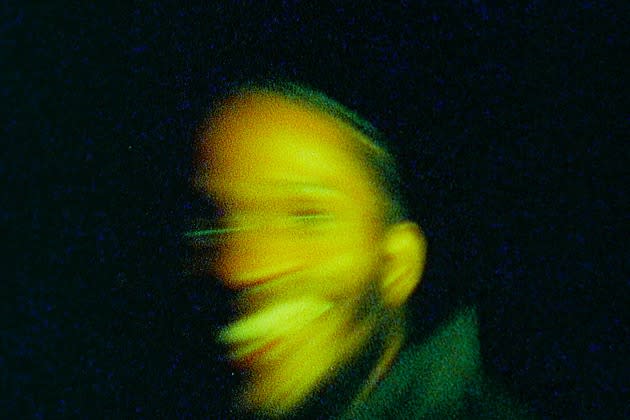Maxo Needed Time (and Some Hallucinogens) To Heal

Last year, Maxo took a trip that changed his outlook. It was an ayahuasca ritual, which his mother had recommended as a way of unpacking the intergenerational trauma that forms a backdrop to his music. After drinking the psychoactive and entheogenic brew, Maxo grounded himself in order to begin the healing process — a hallucinogenic gut-check.
“It taught me to almost knock the crust off my heart to return back to love,” says the Southern California rapper, 28. “There’s so many people that walk around this world cold because they’ve shut off hella feelings. So I think the goal in this life is to stay pure and open.”
More from Rolling Stone
The Future of Club Life is a Hyperpop Rave Called Subculture
Black Thought Celebrates Rap's 50th Anniversary With 'Love Letter to Hip-Hop'
Four years after his Def Jam debut, 2019’s Lil Big Man, he’s putting that idea into practice with his latest album, Even God Has a Sense of Humor. Before Maxo, né Maximilian Allen, put pen to notebook for the meditative 14-track LP, he had to nurture his emotional development. As we talk over Zoom, he mentions a semi-recent breakup that almost diverted his focus, before he was able to turn the pain into reflection.
“It’s kind of like I’m tired of my own bullshit, so this is the year I’ve noticed the cycles enough to break them,” Maxo says. “I’m less tolerant of the little things that have me off-track, even when it’s myself.”
The new album builds on the early releases that brought him an audience. His 2015 EP After Hours, released via Alaskan record label Burnt Tapes, established Maxo as a gravelly wordsmith nestled in rap’s burgeoning lo-fi movement. 2017’s Smile was a snapshot of the rapper in his early twenties, rendering intricate street tales. Two years later, Maxo made his breakthrough with Lil Big Man, offering despondent rhymes on life lessons.
Maxo’s deep familial ties form a throughline through all of his music, with the rapper situated as an archivist, venerating relatives in artistic direction and nostalgic verses. His albums have also been places for him to explore and process painful feelings. Even God Has a Sense of Humor is his most therapeutic project yet, stretching across a tracklist with sincere appearances from Pink Siifu, Liv.e, Melanie Charles, and keiyaA. Rhapsodic production from Dom Maker — one-half of English electronic duo Mount Kimbie — and Karriem Riggins, Madlib, lastnamedavid and more, coat the album, where Maxo attempts to mend his bygones through lines poignant (“Nuri,” “Free!”) and confrontational (“What4,” “Face of Stone”). As a whole, the album tenderly explores hardships that Maxo underwent in the four years since Lil Big Man, some tracks evoking a weariness he was hesitant to revisit.
“A lot of this shit is draining; these are encapsulated moments in an album that’s for the people forever,” he says. “At the same time, I’ve listened to these songs and as I grew with them, they’ve regained different meanings. It’s still a piece of me, I just relate differently now.”
Maxo’s music often sounds like it’s rooted in the genealogy of 1990s L.A. poetic rap progenitors Freestyle Fellowship. Though he acknowledges the connection — and gives a nod to late Freestyle Fellowship affiliate Ganjah K — Maxo insists that he’s more attuned to L.A.’s jazz and beat scenes.
“I feel like this city pigeonholes you a little bit,” he says. “Growing up, I’ve seen people be typical or so different. It’s hard to find a middle space to just be out here.”
Maxo’s independent rap origins and earnest delivery soon brought him to Def Jam, whose A&Rs scoured his SoundCloud uploads before extending a contract. Today, he says that this will likely be his final record for the storied label. “I wouldn’t recommend anybody to sign to a label, especially not Def Jam,” he says. “Shoutout to them [for] what they allowed me to do, but anybody that respects me is going to know that they are just a part of what has already been written.”
L.A. County can be a violent place, and Maxo — raised in Ladera Heights and the bordering Inland Empire — prioritizes survival. “I’ll be on the way somewhere, fall asleep, and I wake up and niggas is like, ‘That shit got shot up, I’m glad you didn’t go to that,’” he says. The cathartic track “We Watch” sees him pleading for life over a funerary arrangement while uplifting future descendants (“I need land/To pass to my grandkids when I’m in the wind”).
Although Maxo is the sole artist in his family, he says the musical homage to his ancestors has kept him down-to-earth and divinely protected. Interwoven through the album’s seams are modest nods to spirituality, from lyrics addressing faith to bursts of soulful, gospel-lite soundscapes. At its core, it’s an album that follows the rapper’s connectedness to a higher being.
“I haven’t always believed in the communication that we have and I haven’t always [known] how to talk to Him,” Maxo says. “So I feel like my whole life, I’ve almost been searching for that phone line. And I think I found whatever vessel He’s allowed me to communicate through.”
Initiating a new chapter in his journey, Maxo’s self-expression is more crystalline than ever. He’s reacquainted with his original purpose of communicating humanness in his art, and he continues to be realer than most.
“I don’t want to walk around setting the wrong precedent for these young niggas that look to me to be honest,” he says. “Naturally, this shit has been very tumultuous, but it’s worth it. I’m right where I need to be on this path, I just had to get here.”
Best of Rolling Stone
